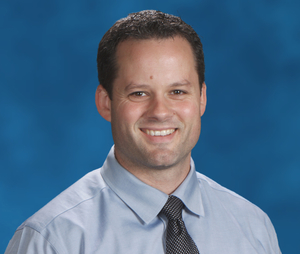Chris Wejr: If we do not take care of ourselves, we will have a harder time caring for others

Making well-being a priority can be a challenge for educators, yet it is critical and makes a positive difference in the well-being and happiness of children and youth. Chris Wejr, the principal of James Hill Elementary School in Langley, shares his journey of finding well-being at work and at home.
Maybe Dad: A Simple and Powerful Message From My Daughters
I sat there and stared at the table setting and welled up in tears. The other 3 plates contained what was left of a family dinner and mine lay there empty. Beside each table setting, my girls had written the names of our family members. Beside my name said “Maby”. Maybe dad. It was a message that broke my heart but I needed to hear. Too many dinner times I had arrived late or not at all because I was in a meeting or just trying to get that important email sent out. Too many dinner times, I had left my wife and daughters with the hope that I would be there for dinner but arrived 15, 30, or 60 minutes late. Now, we are at the point of “Maybe, Dad” for dinner. When we stop and listen to our kids, they can tell us so much… so much that comes unfiltered. So much that comes straight from their hearts.
I remember Chris Kennedy sharing that Barrack Obama had made it a priority to be home for dinner and if the President of the US could do this more often than not, so could he. Whenever I start to complain about my job, Chris is always the first person to tell me, “you signed up for this, you can choose to make it work for you”. I hate it when he says this but he is right. In our job as educators, there will always be the draw to be part of that committee, to attend that workshop, to be part of that meeting, to plan that perfect lesson, or to write that important email. There are many times when we can say no. Saying no to the things we don’t necessarily want to do is easier; saying no to the things we do want to do is much more difficult. We can, however, do this and make our families a priority. We are all busy and we never have “enough time” but we can prioritize our time; if dinner time is important to me, I can make better boundaries and be sure that I am home for this more often.
Yes, there are evenings when I absolutely have to be at the school or in a meeting but there are other times where it is my choice and I prioritize other things over these dinner times. This is not so much about doing way less but perhaps doing things differently. Instead of working until 6:30 and then heading home, I can head home earlier and catch up on work after the kids are in bed. I can still do my job well but shift my schedule so I do not miss out on the most important times in my life… time with my kids – these are times I will never get back and they must be a priority.
Having said this, I also think that we, as a system, need to continually strive to be more understanding of the importance of family and create the conditions for more wellness and balance in the lives of people within our communities. Each person is at a different place and we need to do a better job of seeking to understand and support. It is no secret that people who are healthier and happier are more engaged and more effective at work; we need to make this health and happiness a priority in our schools and districts.
As principals and formal leaders, we can have a significant impact on this but we also need to take care of ourselves. The “airplane oxygen mask” analogy works here too – if we do not take care of ourselves, we will have a harder time caring for others. There will always be a need for some late-afternoon learning sessions, volunteering as after-school coaches and club leaders, and having some fun as a staff beyond the school day but we need to be continually mindful of what we are asking of ourselves and others. If family is a priority and time with family makes people healthier, happier and more engaged at work, as a system we need to support this.
My goal is to put my family in my calendar like I do for meetings and evening events. I have to set better boundaries on leaving school to make sure I am home. I have to learn to say “I can only stay until 5:30”. I can be more reflective on what needs to be done and what can wait. I can be home for dinner more often.
In the past year, there have been some changes that have occurred that have helped me as a father. I am thankful that our superintendent has discouraged emails on the weekends as I find I can be at home and away from work on weekends (and to district staff who are bringing wellness to the forefront). I am thankful that my colleague George Kozlovic encouraged me to take emails off my phone so I can be at home and focus on family. I am thankful that my staff understands that I need to arrive at school a little later in the mornings so I can help my daughters get ready for school and my wife can look after our newborn son. Most importantly, I am thankful that my daughters set my name tag as “maby Dad” and sent me a message to shift my priorities and be home for dinner more often. There will be more times when I get to home to help to cook, serve the food, talk about “what went well” in our days… and the table is set with my name tag saying simply “Dad”.
Do you want to learn more how to cultivate your well-being and increase your effectiveness as an educator? Come and join us for Heart-Mind 2018 on February 23-24, 2018. Register today and learn from leading experts the latest in the science and practice of well-being. Chris Wejr will share his personal story and provide practical examples of strategies he uses to promote his own (and his staff’s) well-being.
Read Chris's latest blog on Building Staff Culture: The Importance of Gratitude, and listen to his outstanding TEDx Langley talk entitled Want to Bring Out The Best in People? Start With Strengths







Comments
Post new comment